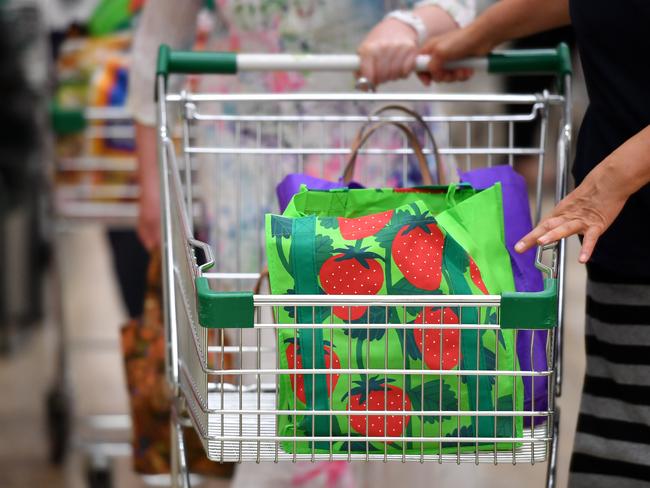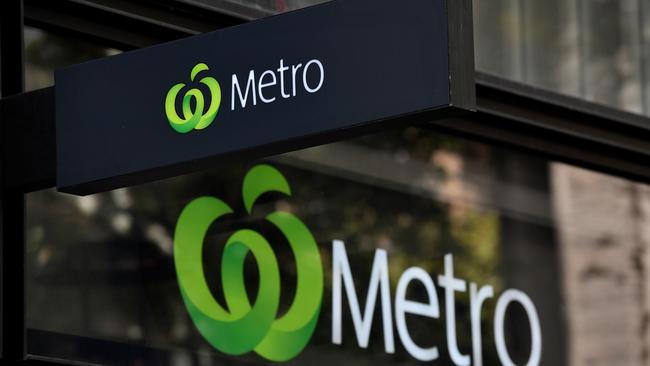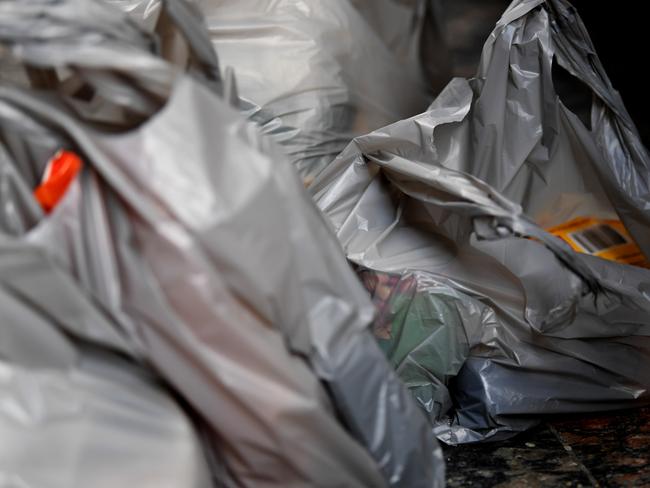Shoppers will be spending more as Woolworths dumps plastic bags
THE cost of visiting the supermarket is about to get more expensive for millions of Australians buying their groceries. Here’s how you will be affected.
Retail
Don't miss out on the headlines from Retail. Followed categories will be added to My News.
THE cost of visiting the supermarket will be more expensive for some Woolworths customers from today and Coles shoppers from July 1.
Shoppers will no longer receive single-use grey plastic bags as Woolworths ditches them across the country — instead consumers choosing to purchase their own bags at the checkout will be stung 15 cents per reusable plastic bag at the checkout or from 99 cents for a foldable bag.

The National Seniors Australia’s chief advocate, Ian Henschke, said it is yet another financial burden for pensioners who will be hardest hit by the ban.
It comes into force in Queensland, NSW, Victoria and WA and falls in line with other states and territories.

“It is another cost that will hit older people particularly aged pensioners who are struggling on fixed incomes to survive,’’ Mr Henschke said.
“Although it may seem like a small amount of money when you are getting a very small amount of money that is something you don’t need to pay a bit extra for.
“It’s going to mean they have less money to spend on the things like the food in the bags.”
MORE: Five ways to reduce your supermarket costs
Woolworths is the first big supermarket to remove free grey plastic bags from today.
Rival supermarket Coles will take longer to dump the bags, removing them from all stores nationally from July 1.
The bag ban is an environmental move from the supermarket giants to reduce the impact of the plastic on the environment including reducing waterways.
Many other countries have also ditched plastic bags including via full or partial bans in locations including Bangladesh which was the first country to ban them in 2002.
Others locations to reduce bag use includes Rwanda, China, Taiwan, some US states, Macedonia, Kenya and some western European countries.

DELIVERIES: Shoppers slugged for getting groceries delivered to their homes
Financial comparison website Canstar Blue’s spokesman Simon Downes warned the dumping of single-use bags “is going to be a culture shock to a lot of shoppers.”
“It’s a change that’s going to take a while for people to adjust to,’’ he said.
“No longer are you just budgeting for food and groceries, you need to make sure you factor in the cost of buying bags.

“No one can doubt that banning single-use plastic bags is good for the environment but if you’re personally not careful, it’s not going to be very good for your supermarket spending.”
A Woolworths spokesman said they’ve been working hard to reduce their stock of single-use plastic bags and any leftover bags removed from stores will be turned into “an array of long-lasting, Australian-made, sustainable products for use in our stores or in our communities”.
Many shoppers have used the grey plastic bags as bin liners but will now have to buy bin bags — another cost added to their budgets.
16 THINGS THAT HAVE REVOLUTIONISED SHOPPING
The banning of the single-use plastic bag in supermarkets will be a culture shock for the unprepared shopper leaving them to spend more money each time they make a trip to the shops.
But it’s not the only change shoppers have experienced in the past three decades when filling up their shopping trolleys — consumers have had to embrace plenty of differences when spending up to fill their pantries and fridges.
- Self-serve check-outs: Shoppers can scan, weigh, bag and pay for their own items without having to engage a shop assistant. These check-outs are in most major supermarket stores and while reducing staff costs they have been a cause for concern when shoppers incorrectly scan items through or don’t scan them at all.
- Home delivery: Ditch the need to visit a supermarket — shoppers can now have their groceries delivered and unpacked on their kitchen bench. But costs do apply. Just recently it was revealed Woolworths would charge costs an additional $3.50 to have their shopping orders delivered by crate or $1 if they arrive in reusable plastic bags. Rival Coles does not charge for crate deliveries but does sting customers opting for deliveries in bags at 15¢ per reusable plastic bag. Other delivery charges also apply. Click and collect — ordering and picking up groceries instore — is also another popular shopping technique to save consumers time trawling supermarket aisles.
- Unit pricing: To make it less confusing for consumers grocery prices must have their actual price and common units of measure, such as grams or millilitres displayed in dollar terms. This was rolled out in 2009 and allows customers to choose the cheapest item according to its unit price.
- Rewards schemes: The supermarket giants have the biggest loyalty schemes in the country allowing customers to earn points as they spend. The flybuys scheme was first introduced in 1994 has more than 8 million active cardholders. Woolworths’ Rewards was established in 2007 and also has more than 10 million members.
- Fuel shopper dockets: Supermarkets offer 4¢ fuel discount dockets for customers who spend over $30 in one grocery shop.
- Sushi stores and bakeries: Some supermarket have gotten even fancier with their own sushi stores inside them and many now have their own bakeries meaning shoppers can buy their lunch and fresh bread and baked goods without having to leave the store.
- Contactless payments: Many customers don’t pay with cash anymore instead they just “tap and go” at the checkout. Contactless payments were first introduced in Australia in 2006.
- Ditching boxes: Supermarkets ditched boxes which shoppers could use to pack their groceries into and remove the need to use plastic bags.
- Bank withdrawals: Customers can use check-outs as an ATM machine by getting cash out.
- Pre-packaged fruit and vegetables: Shoppers can buy their items sliced and diced and packaged up but they’ll pay a premium for this type of item.
- Shopper dockets: Dozens of deals appear on the back of supermarket receipts allowing customers to save at other stores or retail outlets.
- Extended retail trading hours: Depending on where you live extended trading hours are in many locations including some 24-hour supermarkets.
- Supermarket-branded petrol stations: Coles and Woolworths have their own-branded fuel stations to encourage shoppers to spend at these stations using fuel dockets.
- Giveaways: Supermarkets can give consumers collector cards and even free fruit when visiting a store, a marketing technique to attract shoppers and get them to spend certain amounts.
- School sports vouchers: Consumers can collect vouchers when spending up and help schools get new sports equipment.
- Supermarket online sites/apps: Customers can do their shopping online or via their phone app which including viewing items and prices while also finding out exactly where items are located in a particular store to help make it easy when they arrive at the supermarket.
sophie.elsworth@news.com.au
Originally published as Shoppers will be spending more as Woolworths dumps plastic bags
